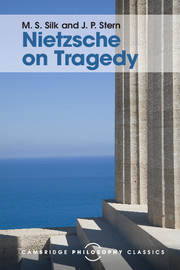Book contents
- Frontmatter
- Dedication
- Epigraph
- Contents
- Preface to this edition
- Preface
- Note
- 1 Germany and Greece
- 2 Biographical background I: Nietzsche and his early interests
- 3 Biographical background II: the genesis of The Birth of Tragedy
- 4 The argument of The Birth of Tragedy
- 5 The aftermath
- 6 Nietzsche's account of Greece
- 7 Mode and originality
- 8 Tragedy, music and aesthetics
- 9 Nietzsche and earlier German theories of tragedy
- 10 Style and philosophy
- Bibliography
- Index
1 - Germany and Greece
Published online by Cambridge University Press: 05 August 2016
- Frontmatter
- Dedication
- Epigraph
- Contents
- Preface to this edition
- Preface
- Note
- 1 Germany and Greece
- 2 Biographical background I: Nietzsche and his early interests
- 3 Biographical background II: the genesis of The Birth of Tragedy
- 4 The argument of The Birth of Tragedy
- 5 The aftermath
- 6 Nietzsche's account of Greece
- 7 Mode and originality
- 8 Tragedy, music and aesthetics
- 9 Nietzsche and earlier German theories of tragedy
- 10 Style and philosophy
- Bibliography
- Index
Summary
Theories of tragedy
Friedrich Nietzsche's book, The Birth of Tragedy, appeared in 1872. It is a book that can be related closely to the age in which it was written, and especially the personal circumstances of its author, then a young classical scholar. It can be related, again, to the mature philosophy of its author's later years. It must, obviously, be considered in relation to the actual matters it is concerned with, of which Greek tragedy is the most specifiable. And in respect of this main concern, it is also to be related to a particular tradition within German thought, which provides us with our starting point: a tradition of theoretical enquiry into the nature of tragedy – Greek tragedy, above all. This tradition goes back at least to Herder and Lessing in the eighteenth century; and it continues beyond Nietzsche to Johannes Volkelt and Bertolt Brecht in our own time. Common to all the contributors, up to and including Nietzsche, is their profound interest in the literature of ancient Greece. They all take issue, in a variety of different ways, with the classic theory of tragedy propounded in Aristotle's Poetics; they all, in the wake of Herder, make some attempt to relate the achievements of the Greek tragedians to the religious or social facts of Greek life; and they all consider the dramas of Aeschylus, Sophocles and Euripides to form one of the summits of world literature. About the other summit there is less agreement: it is not always Shakespeare. But while the reasons for ‘the tyranny of Greece over Germany’ are many, the belief in the paramount value of these Greek plays as in some sense forming one of humanity's fundamental documents is always present.
Why the interest in theory? It is true that preoccupation with theoretical accounts of phenomena of all kinds is characteristic of German culture at least since the day of Leibnitz at the beginning of the eighteenth century, but in this instance there is a more specific reason.
- Type
- Chapter
- Information
- Nietzsche on Tragedy , pp. 1 - 16Publisher: Cambridge University PressPrint publication year: 2016

